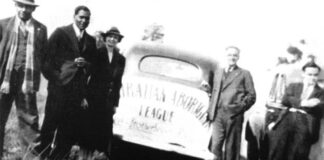In 2008, millionaire mining mogul Andrew Forrest launched a government-supported scheme to employ 50,000 Aboriginal people in mainstream jobs in two years. The Australian Employment Covenant (AEC) was built around the idea that ‘Twiggy’ Forrest’s connections in corporate Australia could be mobilised to solve Aboriginal unemployment.
With six months to go, only 622 people have been employed, and only 88 have stayed in their position for over 26 weeks. Rather than face up to failure, Forrest has re-branded the project as ‘GenerationOne’ and re-launched it at the Opera House. It is complete with a web site, television ads, a travelling road show, and funding from fellow corporate barons Kerry Strokes, James Packer and Lindsay Fox. The two-year target has been quietly dropped.
The project fits hand-in-glove with the Intervention’s assault on welfare rights. The AEC’s vision is: “To change the ‘welfare state’ that has destroyed so many indigenous Australians… To change government policy so that every dollar of government spending is directly linked to the only sustainable way out of poverty—a REAL JOB”.
Forrest’s initiatives fit with the line being run by Noel Pearson and The Australian that blames “welfare dependence” for the poverty and social problems that plague Aboriginal communities. Their solution is ‘tough love’: to force people into towns and into mainstream jobs.
The new Intervention laws will force more Aboriginal people onto permanent, mandatory income management—at a cost of more than $350 million. This push is accompanied by a government takeover of Aboriginal organisations and services (see box).
Jenny Macklin told press at the launch of the GenerationOne bus:
“I’ve seen with my own eyes the difference it makes in the Alice Springs town camps where men and women are starting to work, starting to show their kids that they can be proud of mum and dad going off to work every day to a job.”
But hundreds of Aboriginal people in Alice Springs have lost their jobs because of the Intervention. Civic services, once delivered by the Aboriginal organisation Tangentyere, have been taken over by NT Housing and the Alice Springs Town Council. Some former Tangentyere workers were employed in a high-profile “clean up” project over Christmas, but most are now out of work. No government agency has taken responsibility for mowing the grass that now stands chest high in many town camps.
The dismantling of CDEP (Community Development Employment Projects) in July last year is hitting hard. Macklin promised that the closure of CDEP in remote communities would mean real jobs with award wages—long a demand of the Aboriginal rights movement. This hasn’t happened. Many people in the NT doing up to 40 hours work a week in their communities, from rubbish collection to driving school buses are no longer paid through local councils. They now receive only Newstart Allowance, 50 per cent of which is quarantined onto a “BasicsCard”.
The Australian Education Union in the NT called for 500 full-time jobs to replace those lost after CDEP closures. Only 16 were created, all in communities the government has dubbed “hub towns”. This is part of the government’s effort to depopulate hundreds of towns, communities and outstations.
The AEC website advertises eight jobs in the NT, all located in Palmerston on the outskirts of Darwin. Forrest says he has 17,000 “covenants” with employers like Woolworths and Crown Casino. Aboriginal communities are starved of services and housing, and well-paid jobs for Aboriginal people could meet these needs. But these communities have been labelled “unviable” and the government refuses to fund them. Instead they continue to pour funds into “covenants” with big business that aren’t worth the paper they’re written on.
By Jean Parker





